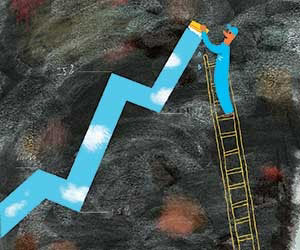We liberals are our own worst enemies sometimes. Take climate change. For over a decade we’ve been promoting the idea of cap-and-trade as a way of dealing with carbon emissions, partly for technical reasons (unlike a carbon tax, it imposes firm caps) but also — in fact, mostly —  for pragmatic and political reasons. A carbon tax, even if it has some theoretical advantages, is unlikely ever to happen. We all know why. Cap-and-trade, because it uses market mechanisms, has a proven track record with acid rain control, and raises money via auctions rather than taxes, has at least a fighting chance.
for pragmatic and political reasons. A carbon tax, even if it has some theoretical advantages, is unlikely ever to happen. We all know why. Cap-and-trade, because it uses market mechanisms, has a proven track record with acid rain control, and raises money via auctions rather than taxes, has at least a fighting chance.
So now that liberals are in control of Congress and the White House and have an actual chance to pass legislation, what happens? Everyone starts talking about carbon taxes instead. Because, you know, in some theoretical economic sense you can argue that they’re more efficient. It’s enough to make you scream sometimes. At least, that’s what it did to David Roberts, who must have been reading my mind after digesting Tom Friedman’s most recent column:
So now, on the cusp of an enormous fight against dishonest and well-funded proponents of doing nothing, Friedman decides it’s time for “an alternative strategy, message and messenger”? Are you f*cking kidding me?! The only conceivable effect Friedman’s endorsement of an alternative bill can have is to divide support and distract attention from the best chance for a serious energy/climate bill in 30 years. His timing could not possibly be worse.
I’m sure Friedman would respond that hey, he’s not a Democratic operative. He’s an independent thinker. He’s under no obligation to stump for a bill that doesn’t make his mustache tingle. And in this he’s like all progressives. They all want to be the Smartest One in the Room. None of them want to sully their purity by compromising or rowing in the same direction. They all want to show how you clever they are, how their pony plan, their messaging, their strategy is the one those silly legislators ought to be using. Meanwhile, the coordinated opposition kicks their ass, over and over again. But at least they’re clever!
Be sure to read the rest of the rant. As David points out, the key part of cap-and-trade is the cap, not the trade. And contra Friedman, it’s not hard to explain a cap on carbon. In fact, it’s a lot easier than trying to explain why a tax will reduce global warming. Here’s the elevator pitch: “We’re going to reduce carbon emissions by setting a nationwide cap on carbon emissions.” See? It’s easy!
It’s true that the trade part of cap-and-trade makes things more complicated, but it’s not all that complicated. It’s just designed to lower the cost of complying with the cap and make everything a little more efficient. Still, the cap is the key. And as for complexity, anyone who thinks that a carbon tax — an actual, real-world carbon tax, not the chalkboard variety — would be nice and simple, hasn’t been paying attention to the way Congress has been making tax policy for the past 200 years. “Simple” is not a word that usually gets used in the same sentence.















